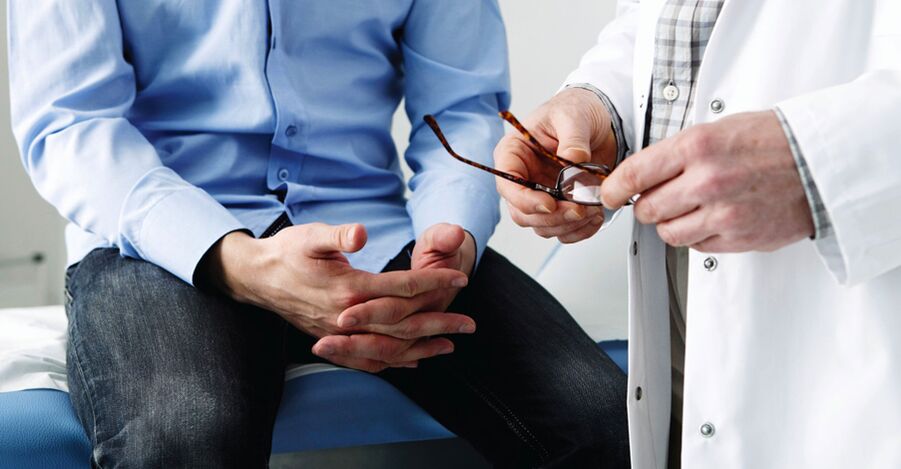Men's nightmares and one of the most unpleasant and subtle diseases - prostatitis. They don’t like to talk about it and don’t pay attention so that serious deterioration arises. . And then - fight the consequences, where all the way is good, but little helps.
How to treat prostatitis so as not to become chronic, and why it is easy for them to get sick, but difficult to get rid of - in our article.
What is prostatitis?
Prostatitis is an inflammation of the prostate gland, an organ owned only by men. Located in the pelvic area, below the bladder. The urethra passes through the prostate.
Prostate function:
- produces secretory glands (male sex hormones), which provide the movement of sperm and are part of sperm;
- blocking the urethra during erection.
How to treat prostatitis depends on whether it is acute or chronic, but first, let’s deal with the symptoms.

How to understand that you are sick
Feelings in acute prostatitis:
- high fever, chills;
- pain when urinating, when stopping gradually or going straight to the toilet, even when the bladder is empty;
- pain in the perineum - can be given under the testicles, in the rectum, in the genitals or sacrum;
- fainting orgasm, no previous feelings during sexual intercourse;
- combustion;
- general malaise - muscle, bone, joint pain - it is difficult for the patient to explain what exactly;
- irritable;
- weakness.
Chronic prostatitis is acute, untreated. The pain disappears completely or is always present, but with less intensity, so that the patient does not notice it. Exacerbations occur periodically in chronic prostatitis. The symptoms are the same as in the acute.
One type of chronic prostatitis is chronic pelvic pain syndrome. Ia:
- persistent, for several months of pain in the pelvic area,
- often urging to use the toilet,
- bad psycho-emotional state.
At the same time, there may be no bacteria in the secretions of the prostate, and the pain is associated with other causes.
Symptoms serve as a clue for the doctor to determine the type and chart how to treat prostatitis.
How to treat prostatitis
Due to an inactive lifestyle and inactive work, blood stagnates. The cause may be infection, lack of sexual intercourse, hypothermia.
When the first symptoms appear - pain and temperature, you do not have to endure and wait for it all to pass by itself. Do not hesitate to see a doctor.
If chronic prostatitis is acute or worsening, you need to do a smear, culture of the genital tract to determine the type of disease (bacterial or non -bacterial), do an ultrasound of the prostate gland.
If in the analysis: gonococci, chlamydia, trichomanade, then treat prostatitis with antibacterial drugs, and bring along with a partner.
If microorganisms such as staphylococci, streptococci, gardenella, mycoplasma, ureaplasma, in this case, antibacterial drugs should not be taken. These microorganisms always live in a person, they are activated during hypothermia, blood stasis, and decreased immunity. How to treat prostatitis in this case? Improves immunity and eliminates blood stasis in the pelvic organs, always undergo a course of preventive physiotherapy. Currently, special physical equipment has been developed and successfully used for procedural relief for men.
What experts prescribe:
- antibiotics;
- anti-inflammatory drugs;
- medicines that facilitate urination;
- special training to improve blood circulation;
- prostate massage;
- physiotherapy;
- vitamin.
The disease does not go away quickly. The acute inflammatory phase is 5-7 days. After that, the symptoms become less obvious. The patient thinks that everything is fine and stops treatment. This is a major mistake. Untreated acute prostatitis becomes chronic, and this is a life with constant discomfort during urination, sexual intercourse and when you sit down.
How to prevent disease

Move more.In your free time, walk, run, swim more. But watch yourself so as not to experience hypothermia. Prostatitis is often associated with blood clots, so active leisure is beneficial, especially if you have an inactive job.
Take care of your immunity.Restores the lack of trace elements and vitamins in the body. Watch your diet, do not get carried away by salty, smoky and spicy foods.
Monitor your health and follow our recommendations so that this disease does not bother you.






























